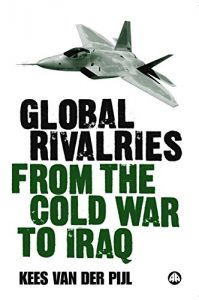'One of those rare books that will change the way thoughtful people think. Global Rivalries is rich in insight, bringing coherence to disparate events. Extremely well documented, [it] will force people to think critically about history and the world we now live in.' Joyce and Gabriel Kolko
'Just when you thought International Relations as a field was dead, along comes Kees van der Pijl's new book. His inspired account brings together history, economics and politics to create a far more nuanced view of rivalry and cooperation among the great powers.' Thomas Ferguson, University of Massachusetts, Boston
'This book should be required reading for all students of international relations and global political economy. It is a magisterial work that explains and demystifies the rivalries and conflicts which have characterised the foreign relations of the "great powers" in the modern era. His thesis is consistent, provocative, and compelling.' Stephen Gill, York University, Toronto
This is a groundbreaking new work from a leading scholar in the field of international relations. Offering a highly original analysis of world events, especially in the light of the Iraq War, Kees van der Pijl explores the history and development of relations between major countries in the international community, and the impact that successive wars and changes in the global political economy have had on the way states relate to each other today.
Tracing the liberal state structure back to the closing stages of the English Civil War and settlement in North America, he argues that the rise of the English-speaking West has created rivalries between contender states that are never entirely put to rest. With each round of Western expansion, new rivalries are created. Offering a truly global analysis that covers every area of the world -- from Europe and America to China, the Middle East, Latin America and Russia -- he analyses the development of international relations post WWII, and questions whether the neoliberal project and its human rights ideology have collapsed back into authoritarianism under the guise of the 'war on terror'.
'Just when you thought International Relations as a field was dead, along comes Kees van der Pijl's new book. His inspired account brings together history, economics and politics to create a far more nuanced view of rivalry and cooperation among the great powers.' Thomas Ferguson, University of Massachusetts, Boston
'This book should be required reading for all students of international relations and global political economy. It is a magisterial work that explains and demystifies the rivalries and conflicts which have characterised the foreign relations of the "great powers" in the modern era. His thesis is consistent, provocative, and compelling.' Stephen Gill, York University, Toronto
This is a groundbreaking new work from a leading scholar in the field of international relations. Offering a highly original analysis of world events, especially in the light of the Iraq War, Kees van der Pijl explores the history and development of relations between major countries in the international community, and the impact that successive wars and changes in the global political economy have had on the way states relate to each other today.
Tracing the liberal state structure back to the closing stages of the English Civil War and settlement in North America, he argues that the rise of the English-speaking West has created rivalries between contender states that are never entirely put to rest. With each round of Western expansion, new rivalries are created. Offering a truly global analysis that covers every area of the world -- from Europe and America to China, the Middle East, Latin America and Russia -- he analyses the development of international relations post WWII, and questions whether the neoliberal project and its human rights ideology have collapsed back into authoritarianism under the guise of the 'war on terror'.












